
Catalysts
Scope & Guideline
Connecting Researchers through Open Access Catalysis Insights
Introduction
Aims and Scopes
- Environmental Catalysis:
Research on catalysts aimed at the degradation of pollutants in air and water, including photocatalytic processes that utilize sunlight for wastewater treatment and the removal of hazardous compounds. - Energy Conversion and Storage:
Studies on catalysts for hydrogen production, carbon dioxide reduction, and the development of renewable energy technologies, including fuel cells and biofuels. - Biocatalysis and Green Chemistry:
Exploration of enzyme-catalyzed reactions and sustainable catalytic processes that utilize renewable resources and minimize environmental impact. - Nanocatalysts and Advanced Materials:
Development and characterization of nanostructured catalysts, including metal-organic frameworks (MOFs) and carbon-based materials, for enhanced catalytic performance. - Catalytic Mechanisms and Kinetics:
In-depth investigations into the mechanisms of catalytic reactions, including the use of computational methods to predict catalytic behavior and optimize performance. - Heterogeneous and Homogeneous Catalysis:
Research covering both types of catalysis, focusing on the design, synthesis, and application of catalysts for various chemical transformations.
Trending and Emerging
- Photocatalysis:
There is a growing emphasis on photocatalytic processes, particularly those utilizing sunlight for pollutant degradation and hydrogen production. Research is increasingly focused on developing efficient photocatalysts that can operate under visible light. - Biomass and Waste Valorization:
Research on the catalytic conversion of biomass and waste materials into valuable chemicals and fuels is gaining traction, reflecting a global push towards circular economies and sustainable resource management. - Electrocatalysis:
The field of electrocatalysis, particularly for CO2 reduction and hydrogen evolution, is rapidly expanding. This includes advancements in materials that enhance electrocatalytic performance and stability. - Metal-Organic Frameworks (MOFs):
The application of MOFs as catalysts is on the rise, driven by their tunable structures and functionalities, which allow for enhanced catalytic activities in various reactions. - Machine Learning and Computational Catalysis:
The integration of machine learning techniques to predict catalytic behavior and optimize catalyst design is emerging as a significant trend, enhancing the efficiency of catalyst development. - Sustainable Catalytic Processes:
There is a notable increase in research focused on green chemistry principles, including the use of environmentally friendly solvents and renewable feedstocks in catalytic processes.
Declining or Waning
- Traditional Homogeneous Catalysis:
There has been a noticeable reduction in research dedicated to conventional homogeneous catalytic processes, as interest shifts towards more sustainable heterogeneous systems. - Petroleum Refining Catalysis:
Research specifically targeting traditional petroleum refining processes is waning, likely due to the growing emphasis on alternative energy sources and sustainable fuels. - Basic Research on Catalysis without Application Focus:
Papers that focus solely on fundamental catalytic science without direct applications or implications in industry or environmental science show a decline, as the journal increasingly prioritizes practical applications. - Low-Temperature Catalytic Processes:
Interest in low-temperature catalytic processes, which were previously more common, appears to be decreasing as researchers seek higher efficiency and performance at elevated temperatures. - Single-Use Catalysts:
The trend towards developing catalysts that are recyclable or have enhanced stability is overshadowing interest in single-use catalysts, reflecting a shift towards sustainability.
Similar Journals
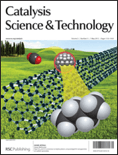
Catalysis Science & Technology
Advancing Catalysis Through Innovative ResearchCatalysis Science & Technology is a leading journal published by the Royal Society of Chemistry, dedicated to advancing the field of catalysis through high-quality research and innovation. Established in 2011, this journal serves as a vital platform for researchers, professionals, and students interested in the latest developments in chemical engineering and catalytic processes. With an impressive Q2 ranking in Catalysis for 2023, the journal is recognized for its significant contributions to the discipline, evidenced by its respectable Scopus Rank of #21 out of 68 in the category and a 69th percentile standing. The journal is committed to disseminating original research that enhances our understanding of catalysis, facilitating knowledge exchange and collaboration within the scientific community. Even without Open Access, Catalysis Science & Technology remains pivotal in shaping innovations that drive forward both academic inquiry and industrial applications, making it an essential resource for anyone involved in this dynamic field.
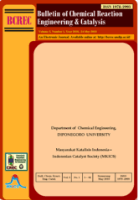
Bulletin of Chemical Reaction Engineering and Catalysis
Fueling Knowledge in Chemical Processes and Catalytic InnovationsBulletin of Chemical Reaction Engineering and Catalysis is a distinguished open-access journal published by UNIV DIPONEGORO, focusing on pivotal advancements in the fields of chemical reaction engineering and catalysis. Since its inception in 2008, this journal has served as a vital platform for disseminating cutting-edge research, catering to a diverse readership that includes researchers, professionals, and students in chemical engineering and related disciplines. With its dedication to publishing valuable insights, the journal has been indexed in Scopus and boasts respectable rankings across various categories, including Q3 in Chemical Engineering (miscellaneous) and Q4 in Catalysis as of 2023. It continues to foster scholarly dialogue and collaboration by providing an accessible means for contributors to share their findings. Operating from Semarang, Indonesia, this journal underscores its commitment to advancing knowledge in chemical sciences, making it an essential resource for those engaged in the study and application of chemical processes.
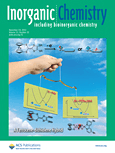
INORGANIC CHEMISTRY
Shaping the Future of Inorganic Science Through ResearchInorganic Chemistry, published by the American Chemical Society, stands at the forefront of the field of inorganic and physical chemistry, boasting an impressive impact in the academic community with a 2023 classification in the Q1 quartile across multiple categories including Inorganic Chemistry and Miscellaneous Chemistry. Since its inception in 1962, this esteemed journal has been a crucial platform for disseminating groundbreaking research, innovative methodologies, and comprehensive reviews integral to understanding the complex behaviors of inorganic materials. With a ranking of #12 out of 79 in Inorganic Chemistry and #37 out of 189 in Physical and Theoretical Chemistry according to Scopus metrics, Inorganic Chemistry has established itself as a premier destination for researchers, professionals, and students alike, eager to stay abreast of pivotal developments and trends in the discipline. Despite being a subscription-based journal, its esteemed reputation and critical contributions make it essential for anyone engaged in the exploration of inorganic chemical phenomena. As it prepares to converge into a new era by 2024, the journal continues to embody excellence and innovation, fostering a dynamic exchange of ideas essential for advancing this vibrant area of science.

ACS Organic & Inorganic Au
Elevating Research Standards in Chemical InnovationACS Organic & Inorganic Au, published by the American Chemical Society, stands as a premier open-access journal dedicated to advancing the fields of organic and inorganic chemistry. Since its inception in 2021, this journal has swiftly risen to prominence, achieving a commendable Q1 classification in Inorganic Chemistry, Organic Chemistry, and Physical and Theoretical Chemistry as of 2023. With an ISSN of 2694-247X, it provides a vital platform for researchers, professionals, and students to disseminate their findings and engage with cutting-edge work across converged disciplines. Operating from its headquarters in Washington, DC, ACS Organic & Inorganic Au is committed to fostering a collaborative research environment, encouraging rigorous peer review, and ensuring the wide accessibility of high-quality scholarly articles. With its open-access model, readers worldwide can freely access and utilize research findings, promoting a global exchange of knowledge crucial for driving innovation in chemistry.

RESEARCH ON CHEMICAL INTERMEDIATES
Exploring the Nexus of Innovation in Chemical ResearchRESEARCH ON CHEMICAL INTERMEDIATES, published by Springer, is a prestigious academic journal that has been contributing to the field of chemistry since 1984. With an ISSN of 0922-6168 and an E-ISSN of 1568-5675, this journal serves as a vital platform for the dissemination of innovative findings and research advancements related to chemical intermediates. Situated in the Netherlands, it has established a commendable reputation, currently ranked in the Q2 category for miscellaneous chemistry and positioned at #131/408 with a 68th percentile in the Scopus rankings. Though it does not operate under an open-access model, the journal plays a crucial role in connecting scientists, researchers, and practitioners to facilitate a better understanding of synthetic methods, characterizations, and applications of various chemical intermediates. Continually publishing high-quality research until its anticipated convergence in 2024, this journal is an essential resource for those looking to expand their knowledge and contribute to the vibrant community of chemical science.

CATALYSIS SURVEYS FROM ASIA
Empowering Catalysis Research Through Open Access CollaborationCATALYSIS SURVEYS FROM ASIA, published by Springer/Plenum Publishers, is a vital resource in the ever-evolving field of catalysis and chemistry. With a dedication to publishing innovative research and reviews from 2002 to 2024, this journal serves as a platform for the dissemination of significant findings that enhance our understanding of catalytic processes and their applications. Although its current impact factor is not explicitly listed, the journal holds a commendable Q3 ranking in Catalysis and Q2 ranking in Miscellaneous Chemistry within the prestigious Scopus database, indicating its relevance and quality among its peers. Open access options ensure that a broader audience can benefit from the research published, fostering collaboration and advancement in the field. By bridging the gaps between academic research and practical applications, CATALYSIS SURVEYS FROM ASIA is indispensable for researchers, professionals, and students committed to pushing the boundaries of catalytic science and technology.
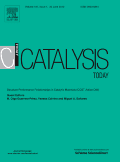
CATALYSIS TODAY
Empowering Catalysis with Cutting-Edge InsightsCATALYSIS TODAY is an esteemed journal published by Elsevier, specializing in the vibrant field of catalysis and its applications in chemical engineering. With the ISSN 0920-5861 and E-ISSN 1873-4308, it has continually contributed valuable research since its inception in 1987 and is set to maintain its influence through 2025. Hailing from the Netherlands, this journal stands out with a notable Q2 quartile ranking in catalysis and a Q1 ranking in miscellaneous chemistry as of 2023, reflecting its rigorous selection of impactful and innovative studies. Its Scopus rankings further substantiate its excellence, highlighting its position in the 89th percentile of general chemistry and 77th percentile in catalysis. CATALYSIS TODAY aims to disseminate cutting-edge findings, fostering exchange among researchers, professionals, and students in the catalysis community. By presenting high-quality research articles, reviews, and case studies, it plays a pivotal role in advancing knowledge and sparking discussions that drive future developments in the field.
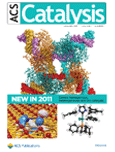
ACS Catalysis
Transforming Ideas into Catalytic SolutionsACS Catalysis, published by the American Chemical Society, stands as a premier journal in the field of catalysis, offering a vital platform for researchers, professionals, and students focused on advancing the science of catalysis and its applications. With an impressive impact factor placing it in the Q1 category for both Catalysis and Chemistry (miscellaneous), this journal has established itself as a leading source of high-quality research findings, currently ranking #21 out of 408 in General Chemistry and #9 out of 68 in Catalysis according to Scopus. Since its inception in 2011, ACS Catalysis has aimed to publish innovative research that addresses the critical challenges in catalytic processes, advancing our understanding of both fundamental and applied aspects of catalysis. With a commitment to promoting open scientific discourse, it serves a vital role for those interested in the latest methodologies, discoveries, and trends in this essential discipline. Based in Washington, DC, ACS Catalysis continues to uphold the highest standards of scholarship and collaboration within the vibrant community of chemists and engineers worldwide.
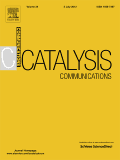
CATALYSIS COMMUNICATIONS
Shaping the Future of Catalytic ProcessesCATALYSIS COMMUNICATIONS is a prestigious journal published by Elsevier, focusing on advancements in the field of catalysis, an essential component of chemical engineering and process technology. With an ISSN of 1566-7367 and an E-ISSN of 1873-3905, this journal is dedicated to the rapid publication of original research and innovative findings that drive progress in catalysis. Recognized for its quality, CATALYSIS COMMUNICATIONS holds a Q2 ranking within the categories of Catalysis, Chemistry (miscellaneous), and Process Chemistry and Technology as of 2023, positioning itself in the upper tier of scholarly publications in its field. The journal has made significant contributions to the scientific community since its inception in 2000, with ongoing research until 2024. While it currently operates without an open-access option, the platform ensures rigorous peer review, maintaining high standards for publication. By engaging with the latest research, CATALYSIS COMMUNICATIONS serves as a vital resource for researchers, professionals, and students, fostering innovation and collaboration in chemical sciences.

APPLIED CATALYSIS A-GENERAL
Fostering Breakthroughs in Catalytic Science and Applications.Applied Catalysis A-General is a premier journal published by Elsevier that serves as a vital resource in the fields of catalysis, process chemistry, and technology. Founded in 1991, this esteemed journal has garnered considerable recognition, reflected in its classification in the Q2 quartile for both catalysis and process chemistry in 2023, as well as its notable rankings within the Scopus database, placing it among the top 20 journals in related disciplines. With an ISSN of 0926-860X and an E-ISSN of 1873-3875, the journal provides a platform for researchers and professionals to disseminate cutting-edge research findings, facilitate knowledge transfer, and foster innovation in the field. While not an open-access journal, it remains accessible through institutional subscriptions, ensuring that critical findings reach a broad audience. The journal's objectives include advancing the understanding of catalytic processes and their applications, making it an indispensable tool for those engaged in this dynamic area of study. Applied Catalysis A-General continues to play a vital role in shaping the future of catalysis, contributing to both scientific progression and practical advancements in various industries.